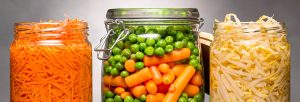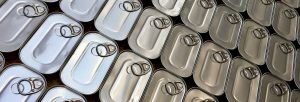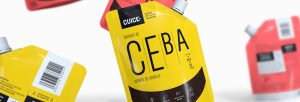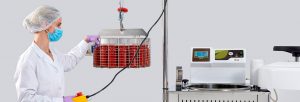Precautions and risks to consider during pasteurization and sterilization of packaged food
If you professionally make gourmet canned food and/or prepared dishes, you know very well that pasteurization or sterilization is necessary and a requirement. Without this final step, your canned food might become a risk for public health. Besides that — it really couldn’t be otherwise — health regulations in your country would prevent you from selling it.
Food sterilization methods
Despite the existence of many different packaged food sterilization methods, we remind you that, to commercialize your canned food/prepared dishes, you need to professionally sterilize them.
- Home or DIY sterilization uses bain-marie to disinfect containers and sterilize ingredients. As you can imagine, this method is not adequate for the commercialization of canned products, since it does not ensure a total elimination of microorganisms and spores in food. Nor does it offer a register of how and how long canned products have been treated.
- Professional sterilization is based on the use of automatic and professional equipment strictly complying with current regulations for health and hygiene. At this point, we might differentiate between two types of professional production:
- Handcrafted, i.e., preparation of packaged food at a small scale, suitable for micro and small business owners, restaurants and farmers.
- Industrial, typical of big companies which produce high quantities of canned food and prepared dishes using huge autoclaves.
Professional handcraft production of gourmet canned food or ready meals
At this point, if you are just starting to manufacture canned food and prepared dishes, or you are a microentrepreneur, or a local producer with a small packaged food production, you must decide whether you want to pasteurize or sterilize your products before commercializing them, so that you comply with all applicable regulations and avoid any sanitary and public health issues.
Pasteurization or sterilization? Aren’t they the same?
- No. Both are techniques for the preservation of food inside hermetic recipients, and they are based on microorganism and enzyme elimination through a heating process during a specific period of time.
- As for pasteurization, it consists of heating food at temperatures under 212 ºF (100 ºC) during some minutes or seconds. This system does not destroy 100% of microorganisms. Because of that, it offers a shorter expiration date and requires refrigeration at all times. By not being so aggressive, it is more respectful of organoleptic properties of ingredients.
- During sterilization, however, canned food undergo temperatures of over 212 ºF for a period of time. This technique is somewhat more aggressive, but it completely eradicates all microorganisms and spores. Hence it allows for a much longer preservation time, without the need for a cool chain.
Learn about all their differences in our Blog.
Considerations during food pasteurization and sterilization
Pasteurization and sterilization are not complicated processes once you master their mechanics and know well what the objective is or what product you are making. They require time and attention though, because:
- Both techniques demand certain temperatures. Not reaching these temperatures may cause some microorganisms and spores to survive inside the product. Consequently, its consumption will not be safe.
- Both in pasteurization and sterilization, you need to manipulate temperature and time. The hotter the temperature, the less minutes needed and vice versa. Everything depends on the food and its pH. If this combination is not correctly balanced, the food will lose its organoleptic properties and this will affect its smell, flavor, color and texture.
- When packaging food, you must keep in mind that some containers require an inner empty space on the top; failing to do this may prevent hermetic sealing or even cause the container to break.
Risks of an incorrect food pasteurization or sterilization

As we have said, not properly pasteurizing and/or sterilizing food may become a risk for consumer health, and consequently for you and your business. Not eliminating most microorganisms and spores in pasteurization or all of them in sterilization may be the cause for food poisoning or something much worse…
One of the most dangerous pathogenic agents is Clostridium Botulinum, which is resistant to high temperatures. To completely eliminate it, an inner temperature of 250 ºF (121.1 ºC) during more than 3 minutes or an equivalent heating treatment is required. Moreover, it can grow and stay inside some canned food without oxygen.
This anaerobic bacterium produces botulinum toxin, which causes botulism, a rare but serious disease that can block nerve functions and lead to respiratory and muscular paralysis and even death.
Although botulism outbreaks from non-sterilized food are rare, they do occur. This is why, when you open a canned food container, you must check its color, smell, whether its liquid is lumpy or muddy, or whether the container is dark or there is gas inside.
Equipment for professionally sterilizing and/or pasteurizing

There are different machines in the market for professionally pasteurizing and/or sterilizing food. We are dismissing the home or DIY option, since we understand that your goal is to sell canned food or prepared dishes across different stores or online. Because of this, we will not address pots or similar equipment. We will focus on professional machinery, such as:
- Electric pasteurizers and sterilizers generally do one or the other, not both. Furthermore, they have a limited capacity.
- Autoclaves. Se trata de un recipiente de presión metálico de paredes gruesas con cierre hermético que mediante vapor de agua a altas temperaturas permite cocer, pasteurizar y/o esterilizar. Eso sí, no todos los modelos del mercado podrán hacer todas estas funciones.
There are autoclaves of many types and for many applications, from those used in dental clinics for medical purposes to the ones used for producing canned food, which must be equipped with cycle regulation for the Fo/Po values, counterpressure and fast cooling, besider offering a perfect traceability.
When choosing a pasteurizer and/or sterilizer, there are many aspects you need to consider. This is not a decision to take lightly, since apart from considering the present, you must think of the future as well, and how you imagine your business within some years.
TERRA Food-Tech® Autoclaves for Handcraft Production

Our vertical or upper load autoclaves have a capacity of 7.3 to 38.5 gallons (33 to 175 liters) and are designed for entrepreneurs, restaurateurs, farmers and chefs to be able to cook, pasteurize and/or sterilize all kinds of canned foods and prepared dishes.
Other technical features of our autoclaves include:
- Respect for organoleptic and nutritional characteristics of the final product.
- Guarantee of compliance with safety and hygiene laws for canned and packaged food.
- Suitable for many types of containers: cans, jars, semi-rigid trays, bags or pouches.
- Very simple installation — they only need 1 water input, 1 drain and 1 power connection.
- Easy to use y program with a colored tactile display and the ability to store up to 50 programs and save default values for elaborating up to 50 different products.
- Fast cooling technology using a water shower.
- Programmable counterpressure and refrigeration to avoid breaking or deformation of containers.
- Security measures: safety valve and thermostat; door blocking system and open-door alarm; pressure and water level sensors; thermal protection around the lid; and a bodywork that protects the sterilization chamber.
- Multiple accessories for all kind of projects: basket elevation crane; customizable, stainless steel trays and baskets; lid and semi-rigid containers hole punching kit…
In addition, the purchase of a TERRA Food-Tech® autoclave includes a food advisory service and professional support, we provide you with free initial technical and food advice.
Also, to facilitate the estimation of the feasibility and performance of your project, TERRA Food-Tech® offers you a free online calculator to calculate the production capacity per cycle, i.e. the amount of containers that can be produced according to the type of vessel and model of autoclave.
If you are a small-business handcraft manufacturer, a farmer, restaurateur or microentrepreneur, and you want to produce your own gourmet canned food and prepared dishes, don’t hesitate to use a professional autoclave to avoid jeopardizing your customers’ health and comply with the applicable regulations.
For more information or to learn about which autoclave is the best fit for your business, you can contact our sales team; we will be happy to assist you.














